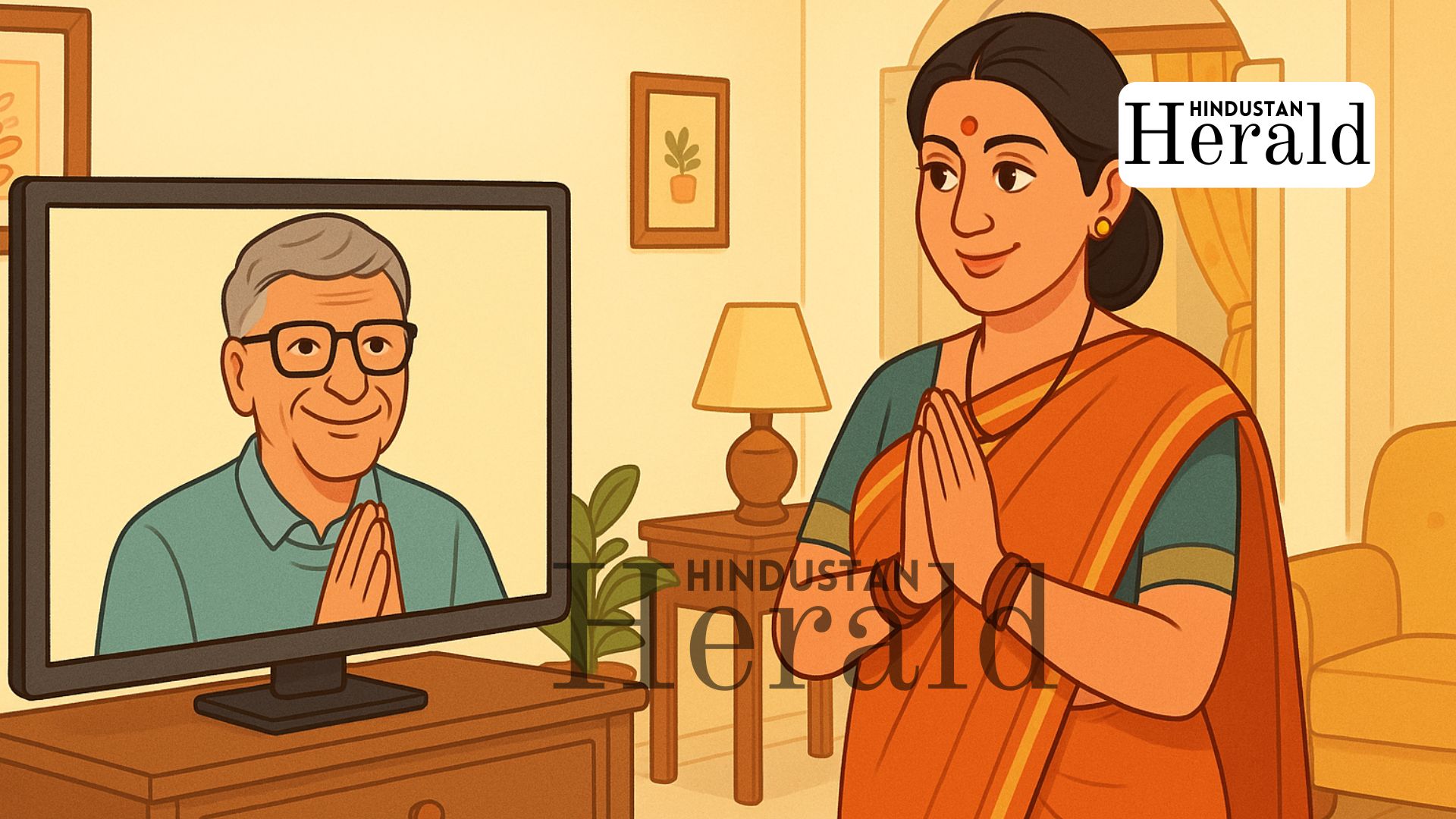New Delhi, October 23: When Bill Gates said “Jai Shree Krishna, Tulsi ji” on Indian television this week, it wasn’t a deepfake, a parody, or a meme gone too far. It was the real thing, the Microsoft co-founder appearing in a promo for the rebooted soap “Kyunki Saas Bhi Kabhi Bahu Thi 2,” sharing screen space with Smriti Irani, the original Tulsi Virani herself.
It’s the kind of crossover no one saw coming: one of the world’s richest men turning up in the sentimental, melodramatic world of Indian prime-time TV, the same universe that once made “saas” and “bahu” part of everyday conversation across the country.
A Cameo That Caught Everyone Off Guard
The short promo, which dropped early Thursday, shows Gates greeting Tulsi with surprising ease: “Jai Shree Krishna, Tulsi ji.” Irani smiles back, visibly amused. Her character replies in Hindi, “Bahut achha laga yeh jaanke ki aap seedhe America se seedhe mere parivaar se jud rahe hain.” Gates, ever polite, answers, “Thank you, Tulsi ji.”
That’s all of fifteen seconds, but it has set the internet ablaze. Clips have been reposted hundreds of times on X and Instagram. One user joked, “Bill Gates made it to Kyunki Saas Bhi Kabhi Bahu Thi before GTA 6 released.” Another wrote, “The multiverse is officially broken.”
For once, though, the buzz isn’t just about celebrity novelty. According to the show’s producers and Gates’ team, the collaboration carries a social purpose a campaign around maternal and child health, nutrition, and women’s welfare. The plan is to weave these themes into two special episodes of the show.
Why Gates Is On Your TV Screen
Gates isn’t new to India, of course. His Bill & Melinda Gates Foundation has been working for years with the government on public health and development programmes, from eradicating polio to improving sanitation and women’s healthcare. But television, especially Indian family drama, is new territory.
People close to the project told several outlets, including The Economic Times and Deccan Chronicle, that this collaboration is an experiment, a way to blend popular entertainment with social messaging. Gates’ virtual cameo, reportedly filmed earlier this month, is being described as “a bridge between the global and the local.”
In plain words, it’s a chance to bring the Foundation’s work into living rooms that don’t necessarily tune in to policy discussions or health seminars.
Smriti Irani’s Double Life
For Smriti Irani, who went from television fame to a cabinet post and back to her original on-screen avatar, the promo feels like a full-circle moment. When the original Kyunki aired at the turn of the millennium, it wasn’t just a TV show; it was a cultural ritual. Viewers stopped dinner to watch Tulsi take on family crises, one teary episode at a time.
Irani, now an experienced politician and Union Minister, said in a behind-the-scenes note that the show’s revival is “not about nostalgia but about reconnecting generations.” Gates’ presence, she said, “honours the power of storytelling to shape awareness.”
The reboot, produced again by Ektaa Kapoor’s Balaji Telefilms, leans on both nostalgia and novelty bringing Tulsi back, but in a world of video calls and global connections. That a tech billionaire’s virtual avatar is part of the plot seems oddly fitting for 2025.
Entertainment Meets Advocacy
The team behind the show is calling this moment “historic” not because a global billionaire dropped by, but because it marks an intentional turn in Indian entertainment: social impact through mass storytelling.
In India, where family dramas routinely attract tens of millions of viewers across age groups and regions, inserting a credible social message can have real weight. Whether it’s the Swachh Bharat push that once used radio soaps to talk about sanitation, or Doordarshan’s Main Kusum Hoon series tackling women’s issues, television has long served as a soft vehicle for awareness.
What’s new is scale and symbolism. Gates’ greeting Tulsi in Hindi is more than polite mimicry; it’s the kind of cultural gesture that signals effort. For many viewers, it humanises a distant figure associated with global philanthropy and billion-dollar tech legacies.
The Bigger Picture
The cameo also arrives at a time when the Indian media is rapidly globalising. Streaming platforms are already bringing K-dramas, Turkish soaps, and Spanish thrillers to small towns. Now, Indian television is looping back outward, bringing international figures into desi storytelling.
If this experiment works, we could see more such collaborations: entrepreneurs, scientists, even activists appearing in mainstream entertainment to talk gently, conversationally about the issues they work on.
Still, there’s a thin line between awareness and tokenism. A two-minute cameo can feel performative unless the script makes it meaningful. The challenge will be to integrate Gates’ appearance naturally, not as a forced insert.
As one producer told Cinema Express, the intent was never to make him play a “character,” but to appear as himself, a man talking about real problems that affect real families.”
Gates, The Investor
While the cameo grabbed India’s attention, Gates also made headlines abroad this week for an entirely different reason his portfolio. A recent AOL report noted that nearly 79% of his roughly $48 billion stock portfolio sits in just four companies. That level of concentration might raise eyebrows among traditional investors, but for Gates, those holdings in Microsoft, Berkshire Hathaway, Waste Management, and Canadian National Railway reflect long-term faith in stable, impact-heavy businesses.
So, in a single week, Gates managed to make news both for hugging India’s cultural mainstream and for his quietly concentrated approach to wealth.
The Public’s Verdict
Within hours of the promo going live, YouTube and Instagram comment sections turned into mini-debating arenas. Some fans adored the gesture, “He said Jai Shree Krishna better than most of us” while others found it surreal. But nearly everyone agreed on one thing: it was unexpected, and it worked.
If nothing else, the image of Bill Gates smiling at Tulsi Virani might become one of those strange, enduring snapshots of global pop culture, proof that in India, even the world’s most serious technocrats aren’t immune to the pull of primetime melodrama.
And maybe that’s the point. When philanthropy, politics, and television meet in the same frame, it’s easy to laugh but also hard to look away.
Stay ahead with Hindustan Herald — bringing you trusted news, sharp analysis, and stories that matter across Politics, Business, Technology, Sports, Entertainment, Lifestyle, and more.
Connect with us on Facebook, Instagram, X (Twitter), LinkedIn, YouTube, and join our Telegram community @hindustanherald for real-time updates.
Covers films, television, streaming, and celebrity culture with a focus on storytelling trends.






